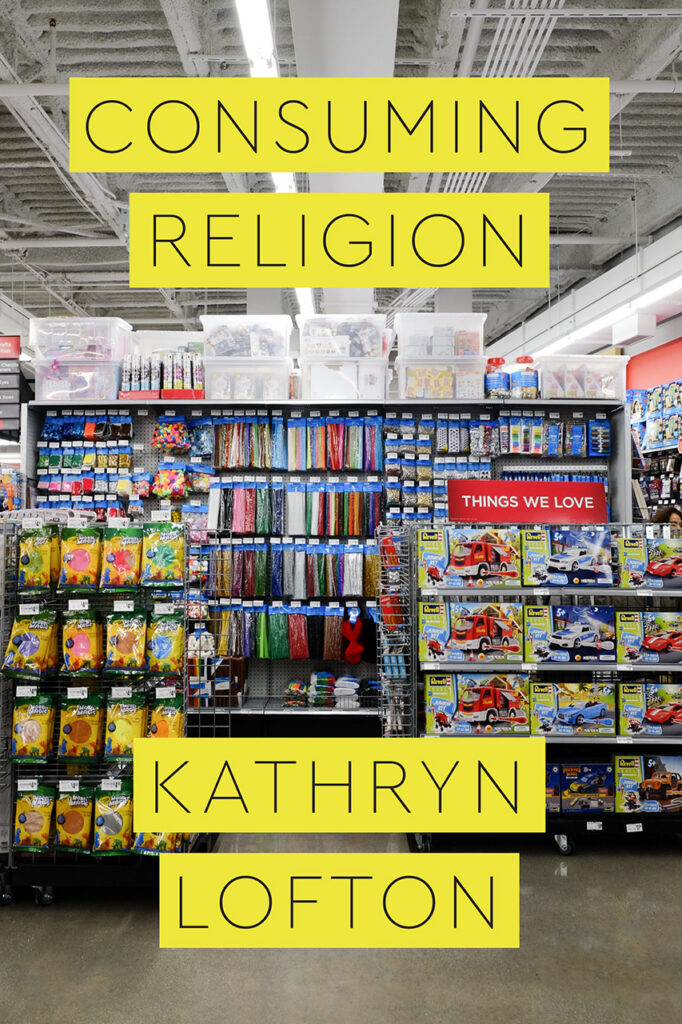What inspired you to write Consuming Religion?
Restlessness. After I finished my first book, I realized quickly that I left several major questions without satisfying answers. First, why does progressive change seem to need to be represented first in conservative drag? The simplest example of this could be seen in the figure of Michelle Obama, who found herself schooled during the electoral process into becoming a political mannequin because the American public prefers its radical difference determined by physicality rather than by speech. (Anne Helen Peterson is simply brilliant on this point, distilling how contained we need our public women to be. This thoughtful response to Peterson’s work shows what a rich world of critique pop culture provides.)

Consuming Religion
Kathryn Lofton
U. of Chicago Press
September 12, 2017
In Consuming Religion, I discovered answers to both dangling problems in the conjoined histories of families and corporations in the United States. Not only how so many businesses are family-owned businesses at their origin, but also how so many contemporary corporations promote themselves as like families, amplifying the rhetoric of mutuality and care in part to obscure the way they are offering fewer benefits and expanding the ranks of contingent labor.
In part, too, to prod its workers to keep going, to keep making, even despite these losses, for the ostensible “good” of the corporate family. The local family-owned restaurant is replaced by the international chain offering “family style” portions, the large corporation—now offering ever fewer retirement benefits—nevertheless commands more spiritual vulnerability from its employees.
For better and for worse, the family is the defining metaphor for our social organization. And so I suggest that Americans so compulsively embrace the language of change because capitalization is the bass note for our fantasies of familial reproduction. Submission to that domestication is the only route to social legibility. Like anyone who writes in this arena, I am deeply indebted to Marx, to Maurice Bloch, and to Kathi Weeks, each of whom develops a substantial account of the problems our family sentiments beget. Into this mighty river of critical thought, I seek to insert a depiction of consumption that sells itself obsessively through the ritualized frames of family practice and fulfillment, not only in the advertisements we all see, but also through the private corporate communities that increasingly determine our personal political limits.
What’s the most important take-home message for readers?
First, nobody evades being organized by something; second, if you’re being organized by something, it is worth learning the terms for that organization; third, if you learn one and two, you will be a part of the study of religion.
Every Goldman Sachs employee with whom I met was absolutely comfortable with the word religion applied to their community. Indeed, when I pressed them, saying how many scholars of religion found the term problematic for the following x or y reason, they got it, but they still didn’t care. They didn’t mind the word because they liked how it demonstrated the seriousness, the proud intensity, of their collectivity.
And this is what I want to emphasize in my study of consumer culture and religion: religion is a word for how people consciously organize themselves in the world and unconsciously are organized by the world. Insofar as ours is a world built by material and immaterial networks and grids, I think we’re missing out if we think of those networks and grids as secular or irreligious.
We are missing out insofar as we are missing what I have found as the archival intention of designers. Namely, to organize themselves (and us) into a world they get thereby to organize. The problem of collectivity is the danger of assimilating into any grid. The possibility of collectivity is the strength we have to rewrite our frames, together, to design different societies.
Is there anything you had to leave out?
Yes, a reviewer told me to drop a chapter and they were absolutely right. It was unnecessary throat-clearing.
What are some of the biggest misconceptions about your topic?
That I am describing the religion of X. The religion of Oprah or the religion of Goldman Sachs. No, I am showing how the study of religion offers useful tools to think about how we collectively organize ourselves. Just because someone who works at Amazon describes it as a cult does not mean I (or they) think it meets the exemption requirements described in IRC 501(c)(3). What it means is that students of religion are going to be uniquely advantaged in the effort to explain the political, economic, and social consequences of such a claim about Amazon.
Did you have a specific audience in mind when writing?
I am writing for the undergraduate classroom, first and foremost. I am happiest when I hear that what I have written makes someone’s teaching life easier and more exciting. Teaching is the lifeblood of academic survival, and I have a hard time understanding why we write if not to affect those classrooms in one way or another.
That said, during the actual work of composition I don’t think a lot about an external audience. I think about other writers whose voices crowd my own mind. You can’t write about pop culture without a hard lean into the brilliant landscape of contemporary writers on the subject, people who find in entertainment media, celebrity, and gossip a lot of philosophical and socio-political content.
The best working voices out there for me are Bim Adewunmi, Taffy Brodesser-Akner, Hua Hsu, Elaine Lui, Soraya McDonald, and of course the great Hilton Als. I look back at James Baldwin, Roland Barthes, Janet Malcolm, and Pauline Kael and see in these newer writers the same capacity for transforming the seemingly inconsequential into something imperative as those older ones. I don’t think it’s coincidental that the best voices in pop criticism are more diverse than the best voices in the American academy. The materials of mass culture are simply more accessible to a wider population, and when you create a fairer space for competitive possibility, you’ll find a more diverse set of people at the top.
That said, I am a big fan of academic nerds, and I openly borrow from the creativity and discipline of people like Daphne Brooks, Tracy Fessenden, Avery Gordon, Martin Kavka, and Jonathan Z. Smith, because I consider those writers to be generous kindred, especially in their commitment to the essay or article or standalone chapter. I’ll often return to something they’ve written like it’s a how-to manual to see how they do things, formally (i.e., how many paragraphs of exposition, what level of citation for a given proper noun, how many pieces of data per sentence).
At the level of existential inspiration, I think of those people whose genius haunts. In my thinking life, those people are Lauren Berlant, Saadiya Hartman, Nancy Levene, and Susan Stewart. Each of those people does more than examine a given thing. They actually explain something through the very ways they convey their thought. They are bravely asking how we ought to speak, now, given the frequent failure of (certain forms of) speech to do much more than reiterate the prisons of modernity. If I could write something that an undergraduate understands that might begin to approximate their levels of hermeneutic seriousness, I would be a satisfied writer. I don’t think I’ve done it yet, but: I’m not done trying.
Are you hoping to just inform readers? Entertain them? Piss them off?
I have zero information to give that readers can’t find out easily themselves. Some of my best quotations in this book come from compulsive binge viewers who blog, Ivory soap advertisements, Kim Kardashian’s Twitter feed, and the Permanent Subcommittee on Investigations for the U.S. Senate, so my archive isn’t exactly informationally obscure.
What I am trying to do is to get people to think about their entertainments and absorptions. Why can’t you stop clicking hyperlinks? Why do you hate-watch Real Housewives? Why do we obsess about our children’s welfare and develop a strange devotion to bad workplaces? This tug of unstoppable attachment forms the locus of my interest. I want people to think about how the desire to keep consuming something is connected to our other acts of creation, including the will to forge a child a particular way as a parent or to design a commodity that could change your life.
What alternative title would you give the book?
I thought about adding a subtitle, like Corporatism and Commodity in the American Family but in the end I liked the quiet of a shorter title. There is a 2004 book with the same title, albeit with a strong subtitle: Consuming Religion: Christian Faith and Practice in a Consumer Culture by Vincent J. Miller. I think Miller would agree that his book is a primary source for me as mine would be for him: what I describe as socially inevitable he dissects as theologically problematic. I like that these two books will commingle on Amazon.com, since I think the study of religion has not exactly figured out the relationship between Religious Studies and Theology, so if our books can provide a dialogue on the distinction and co-relation, all the better.
How do you feel about the cover?
So pleased about it that it’s somewhat indecent. The photo captures an interior of a Michael’s craft supply store. Their corporate slogan is “Make Creativity Happen.” For me craft stores summarize the simultaneity of social domestication, individual creativity, and mass reproduction that I discuss throughout the book. The photo is by Alan G. Thomas, a brilliant artist who also just happens to be the Editorial Director for Humanities and Social Sciences at the University of Chicago Press. I couldn’t be more honored to have this image saturating the cover.
Is there a book out there you wish you had written? Which one? Why?
I wish I could be Tina Weymouth for an hour onstage in 1979, Missy Elliot in 1999, or Björk basically anytime. Otherwise, I’m good.
What’s your next book?
I am grateful to be asked this question. So, when I say that I am annoyed by the question, please know that this annoyance is not directed at the questioner as much as the habit of the question. This annoyance is in part because I’m low-grade superstitious about writing work, and in part because I don’t like the pretense that whatever work I am doing is best conveyed through the way we tend to talk when we talk about research. So, to illustrate my point, let me answer the question first the way I think we tend to speak, and then answer it the way I think is true.
What we say: I am always working on several things at once. Right now, I am continuing a longstanding exploration of Bob Dylan, his fandom, and his artistic iconicity; I am thinking about the queer history of American church organ manufacture; and I am working on a collection tentatively titled Sensitive People. In it, I’m thinking about the emergence of sensitivity as a comment and classification in late modernity.
What is true for me: I get up every day and try to be of service to the institution that pays my salary and structures much of my epistemological and practical reality. Because I work at an institution that values something labeled “research,” I must think strategically about how to construct feasible projects with regular deadlines in refereed publication venues respectable to the standard—established by that institution—as “first rate.” Because I am tenured, I seek also to ask bigger questions whose answers (and the unpredictable duration of their development) resist the forms of productivity that I think undermine our capacity to truly learn, think, or know anything of value.





